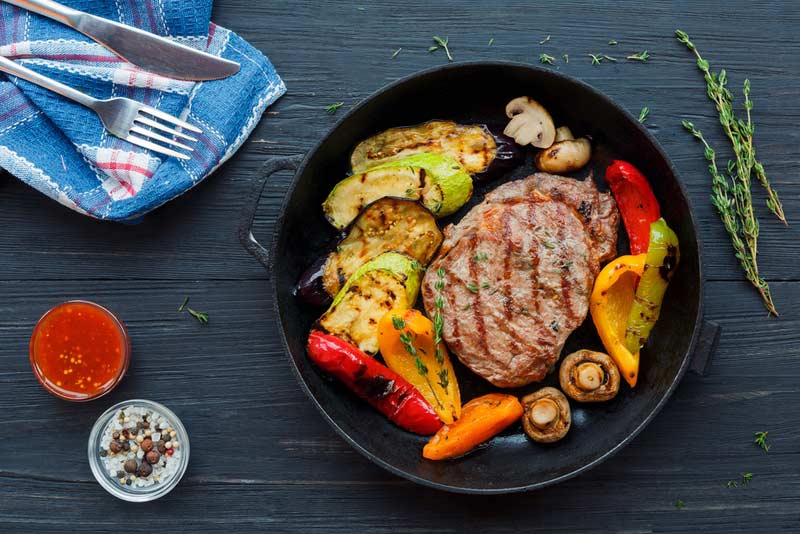8 Easy Ways to Stop Food Cravings in Their Tracks

Can’t stop cravings sweets? Whether it’s the constant urge to reach for a bag of sweets or munch on salty chips, cravings have a way of creeping up on us.
But what exactly causes them in the first place? Read on to discover what might be triggering food cravings and easy ways to stop cravings in their tracks.
7 Things That Cause Cravings
The Brain: Many cravings are caused by the part of the brain associated with reward and pleasure, indicating that the food being craved produces a pleasurable and enjoyable response. This can be especially true for sugary foods.
Hormones: Imbalances with the hormones that regulate appetite – ghrelin and leptin – can result in general food cravings and the desire to eat when not hungry.
Emotions: Stress and other emotional triggers can prompt the desire to eat, especially if you associate stress with a go-to comfort food.
Pregnancy: Pregnancy disrupts normal taste buds and sense of smell, causing cravings for foods that one normally wouldn’t desire.
Nutrient Needs: Some theories about cravings suggest that specific foods indicate underlying nutrient deficiencies or needs, such as salt cravings for adrenal weakness and chocolate cravings for low magnesium levels.
The Gut: The enteric nervous system is the part of the autonomic nervous system that lives in the gut. It’s connected to the brain by many nerve endings and sends signals back and forth constantly. The microbiome – the collection of good and bad bacteria that reside in the gut – can send out cravings for the foods it needs to survive. This is especially true of bad bacteria and sugar or junk food cravings.
Fatigue: We’re more likely to give into cravings and the desire for junk food when exhausted, run down, and short on sleep. Being well rested helps the brain and every other part of the body function optimally. (1, 2)
8 Ways to Beat Cravings
Just because you have a craving doesn’t mean it has to derail your plans. Learning to move through and redirect cravings is a powerful way to take control of your health.
1. Practice Deep Breathing
Cravings can be driven by stress, and research shows that deep breathing, meditation, and other relaxation practices can help to reduce food cravings and feelings of stress. (3, 4)
Any form of meditation or breathwork that promotes feelings of calm helps. So whether you’re at home or standing in the breakroom breathing and counting to 10, take a moment to pause before giving into a craving. Relaxation techniques can work in the moment, but they also build effectiveness with regular use, even if just for a few minutes each day.
2. Drink Water

Many people mistake thirst for a desire to eat. This can be especially true if the desire for food appears suddenly at a time when you wouldn’t necessarily be hungry. (5)
How much water you need each day depends on many factors: age, weight, activity level, and whether you’re pregnant or not. There is no one-size-fits-all answer for how much water you need, but opting for half your body weight in ounces is commonly recommended as a good starting point. Adjust from there as needed.
3. Practice Mindful Eating
When you adopt a mindful eating practice, you can address cravings on a deeper level. Food is often turned to for comfort or deflection, and mindfulness can help to improve your emotional relationship with food. (6, 7)
Mindful eating involves being more aware of the process and slowing it down. It can also help to focus on better food choices. (8) In today’s culture, meals are often done quickly and on the go with little thought given to chewing and digestion. The parasympathetic nervous system, the part of the autonomic nervous system responsible for “resting and digesting,” requires downtime to do its job. Mindful eating helps to focus on chewing thoroughly, which alleviates some of the burden from the stomach and small intestine in ensuring that food is fully broken down.
4. Use Aromatherapy

Aromatherapy can be helpful in reducing cravings and promoting weight loss, although this is still a subject of emerging research. (9) Essential oils can help to reset the mind and provide clearer focus. Peppermint, jasmine, and grapefruit oils can be especially useful for avoiding cravings.
To use essential oils for fighting cravings, smelling them directly from the bottle is often the best approach. By perpetually diffusing oils, you may become accustomed to the smell and even begin to associate it with the desire to eat.
5. Drink Tea
Next time a craving hits, try drinking some herbal tea. Regardless of the type, most people find tea to be a soothing beverage due to the comforting warmth and scent. Even the practice of stopping to brew tea can redirect your urge to reach for snacks.
6. Eat Protein

Protein helps to promote balanced blood sugar and insulin levels which, when imbalanced, can lead to cravings for carbs and sweets. Protein also helps you stay fuller longer and can lead to reduced cravings while also boosting your energy. (10) It can also cut the urge to snack by as much as 50 percent. (11)
Paleo is rich with plenty of protein sources, including wild-caught seafood, pasture-raised poultry and eggs, grass-fed beef, nuts, and seeds. How much protein you need each day depends on your dietary goals, sex, age, and digestive wellness, but most Paleo nutritionists will recommend quality protein with every meal.
7. Eat Real, Whole Foods
If you’re eating low quality meals filled with processed foods and little nutrition, your body will end up craving nutrients right after eating. To prevent this, fill your plate with real foods, including leafy veggies, quality meats, fresh fruits, unsalted nuts and seeds.
Eating nourishing, whole foods will give your body the nutrients it needs and you’ll be less likely to be hungry afterwards.
8. Get Some Sleep

Sleep and tiredness have a strong say in appetite and cravings. Being sleep deprived or excessively tired can cause digestive problems because of disrupted hormone production, but it can also lead to stronger cravings. (12)
Chronically tired people are 55 percent more likely to gain weight and become obese, partially due to problems with hormone signaling that controls appetite and because tiredness boosts the urge to eat for comfort. (13)

The post 8 Easy Ways to Stop Food Cravings in Their Tracks appeared first on PaleoPlan.
from PaleoPlan https://ift.tt/2B5ya16
Entry Published : August 13, 2018 at 08:06AM
EntryContent :

Can’t stop cravings sweets? Whether it’s the constant urge to reach for a bag of sweets or munch on salty chips, cravings have a way of creeping up on us.
But what exactly causes them in the first place? Read on to discover what might be triggering food cravings and easy ways to stop cravings in their tracks.
7 Things That Cause Cravings
The Brain: Many cravings are caused by the part of the brain associated with reward and pleasure, indicating that the food being craved produces a pleasurable and enjoyable response. This can be especially true for sugary foods.
Hormones: Imbalances with the hormones that regulate appetite – ghrelin and leptin – can result in general food cravings and the desire to eat when not hungry.
Emotions: Stress and other emotional triggers can prompt the desire to eat, especially if you associate stress with a go-to comfort food.
Pregnancy: Pregnancy disrupts normal taste buds and sense of smell, causing cravings for foods that one normally wouldn’t desire.
Nutrient Needs: Some theories about cravings suggest that specific foods indicate underlying nutrient deficiencies or needs, such as salt cravings for adrenal weakness and chocolate cravings for low magnesium levels.
The Gut: The enteric nervous system is the part of the autonomic nervous system that lives in the gut. It’s connected to the brain by many nerve endings and sends signals back and forth constantly. The microbiome – the collection of good and bad bacteria that reside in the gut – can send out cravings for the foods it needs to survive. This is especially true of bad bacteria and sugar or junk food cravings.
Fatigue: We’re more likely to give into cravings and the desire for junk food when exhausted, run down, and short on sleep. Being well rested helps the brain and every other part of the body function optimally. (1, 2)
8 Ways to Beat Cravings
Just because you have a craving doesn’t mean it has to derail your plans. Learning to move through and redirect cravings is a powerful way to take control of your health.
1. Practice Deep Breathing
Cravings can be driven by stress, and research shows that deep breathing, meditation, and other relaxation practices can help to reduce food cravings and feelings of stress. (3, 4)
Any form of meditation or breathwork that promotes feelings of calm helps. So whether you’re at home or standing in the breakroom breathing and counting to 10, take a moment to pause before giving into a craving. Relaxation techniques can work in the moment, but they also build effectiveness with regular use, even if just for a few minutes each day.
2. Drink Water

Many people mistake thirst for a desire to eat. This can be especially true if the desire for food appears suddenly at a time when you wouldn’t necessarily be hungry. (5)
How much water you need each day depends on many factors: age, weight, activity level, and whether you’re pregnant or not. There is no one-size-fits-all answer for how much water you need, but opting for half your body weight in ounces is commonly recommended as a good starting point. Adjust from there as needed.
3. Practice Mindful Eating
When you adopt a mindful eating practice, you can address cravings on a deeper level. Food is often turned to for comfort or deflection, and mindfulness can help to improve your emotional relationship with food. (6, 7)
Mindful eating involves being more aware of the process and slowing it down. It can also help to focus on better food choices. (8) In today’s culture, meals are often done quickly and on the go with little thought given to chewing and digestion. The parasympathetic nervous system, the part of the autonomic nervous system responsible for “resting and digesting,” requires downtime to do its job. Mindful eating helps to focus on chewing thoroughly, which alleviates some of the burden from the stomach and small intestine in ensuring that food is fully broken down.
4. Use Aromatherapy

Aromatherapy can be helpful in reducing cravings and promoting weight loss, although this is still a subject of emerging research. (9) Essential oils can help to reset the mind and provide clearer focus. Peppermint, jasmine, and grapefruit oils can be especially useful for avoiding cravings.
To use essential oils for fighting cravings, smelling them directly from the bottle is often the best approach. By perpetually diffusing oils, you may become accustomed to the smell and even begin to associate it with the desire to eat.
5. Drink Tea
Next time a craving hits, try drinking some herbal tea. Regardless of the type, most people find tea to be a soothing beverage due to the comforting warmth and scent. Even the practice of stopping to brew tea can redirect your urge to reach for snacks.
6. Eat Protein

Protein helps to promote balanced blood sugar and insulin levels which, when imbalanced, can lead to cravings for carbs and sweets. Protein also helps you stay fuller longer and can lead to reduced cravings while also boosting your energy. (10) It can also cut the urge to snack by as much as 50 percent. (11)
Paleo is rich with plenty of protein sources, including wild-caught seafood, pasture-raised poultry and eggs, grass-fed beef, nuts, and seeds. How much protein you need each day depends on your dietary goals, sex, age, and digestive wellness, but most Paleo nutritionists will recommend quality protein with every meal.
7. Eat Real, Whole Foods
If you’re eating low quality meals filled with processed foods and little nutrition, your body will end up craving nutrients right after eating. To prevent this, fill your plate with real foods, including leafy veggies, quality meats, fresh fruits, unsalted nuts and seeds.
Eating nourishing, whole foods will give your body the nutrients it needs and you’ll be less likely to be hungry afterwards.
8. Get Some Sleep

Sleep and tiredness have a strong say in appetite and cravings. Being sleep deprived or excessively tired can cause digestive problems because of disrupted hormone production, but it can also lead to stronger cravings. (12)
Chronically tired people are 55 percent more likely to gain weight and become obese, partially due to problems with hormone signaling that controls appetite and because tiredness boosts the urge to eat for comfort. (13)

The post 8 Easy Ways to Stop Food Cravings in Their Tracks appeared first on PaleoPlan.
via IFTTT
No comments: